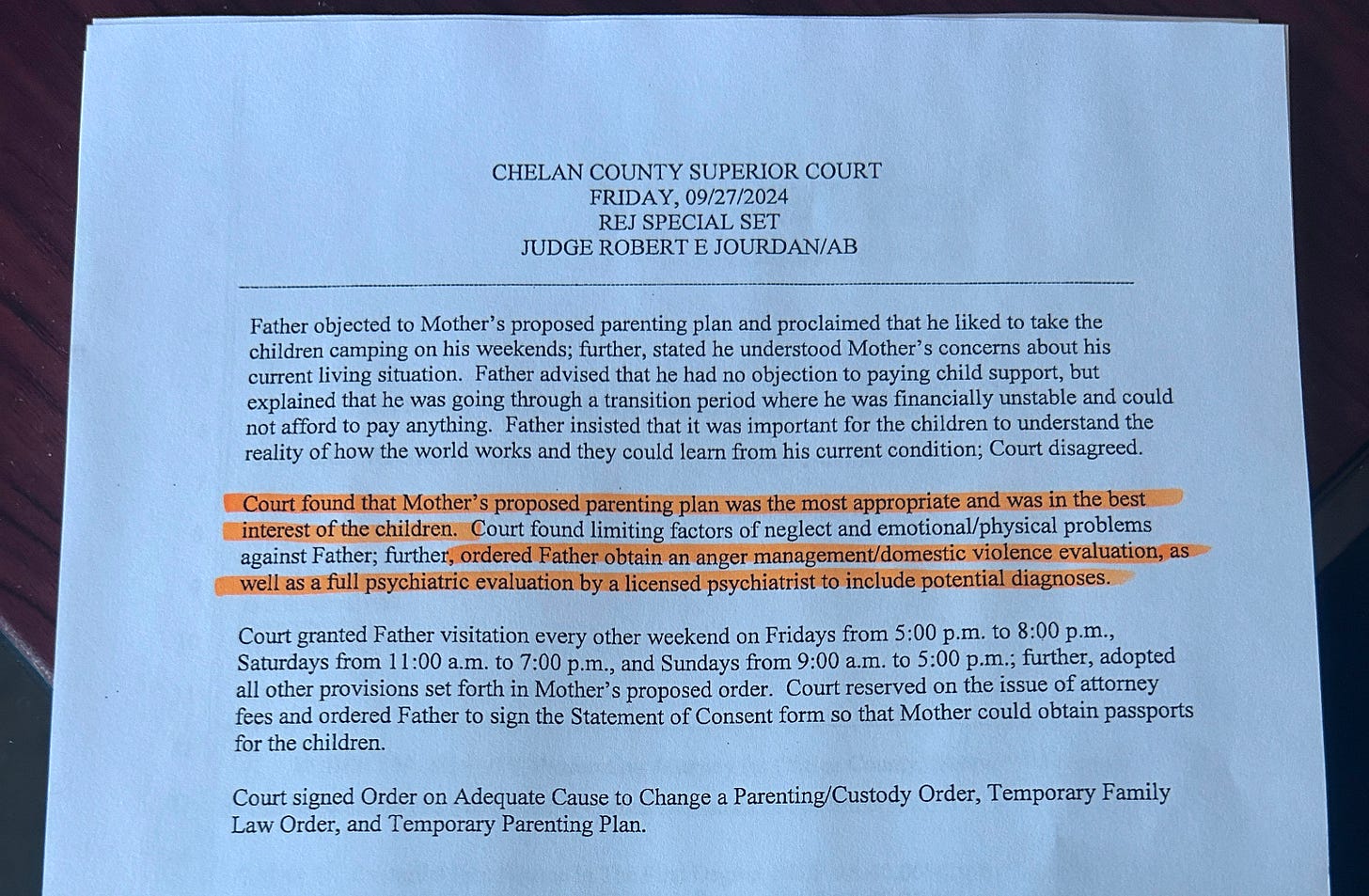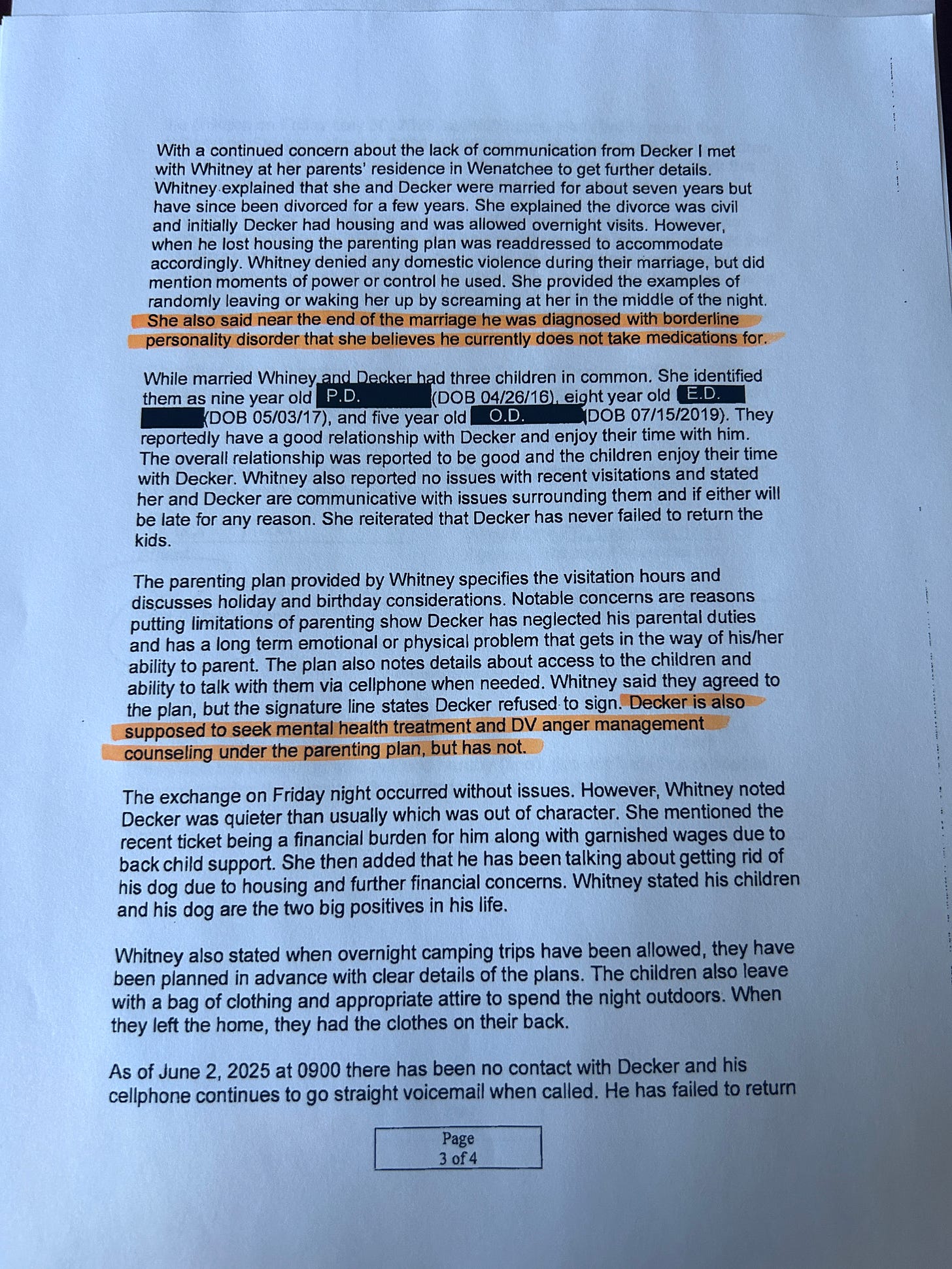Suspected Murderer Travis Decker Refused Court-Ordered Mental Health Assessment, Treatment
Decker was in violation of orders implemented by Chelan County Superior Court, had borderline personality disorder and was experiencing mental health issues when he picked up his daughters, docs say

As the massive manhunt for suspected murderer Travis Decker continues, court documents show that he was not complying with orders to get a psychiatric evaluation and mental health treatment and has borderline personality disorder he was refusing to take medication for.
Decker is suspected of murdering of his three young daughters, ages 5, 8 and 9, who went missing Friday, May 30. The search for him and the children started after he failed to return them to their mother Whitney Decker that evening. A couple hours after they were supposed to be home she contacted the Wenatchee Police Department, distraught and told WPD that Decker is “currently experiencing some mental health issues.”
Authorities found the children’s bodies near the Rock Island Campground off of Icicle Road outside of Leavenworth on June 2 around 3:45 pm.
It’s a tragedy that has rocked the small, rural communities of North Central Washington and left folks asking why and how this could happen. While the answers to all the questions may never be answered, court records show there were some red flags leading up to the present heartbreaking circumstances.
At a custody hearing on August 27, 2024 Travis and Whitney, along with her attorney Arianna Cozart, appeared before Chelan County Superior Court Judge Robert Jourdan to change the parenting plan for the three children.
“Ms. Cozart argued that there was a substantial change in circumstances as to Fathers’ ability to parent children safely,” the hearing minutes read.
Due to these concerns Ms. Cozart asked Judge Jourdan to order Decker obtain a domestic violence evaluation and requested that he participate in a psychiatric assessment.
Decker is a veteran and homeless and Cozart said his mental health got worse after his time in active Army service.
“Mr. Decker’s issues really expounded significantly when he became inactive,” Cozart said. “So of course, very grateful for his service. I think he’s just struggling right now and it is affecting his children.”
Cozart also said her client should be able to limit visitation at her discretion.
Decker, representing himself Pro Se, admitted he was homeless and spoke about his struggles after leaving the army.
“When I was separated from my original active duty I came out into the civilian world and tried to figure out a way that I could live as a civilian,” he said. “I didn’t have family, I didn’t have friends, I didn’t have any support. Especially coming into a state where I didn’t have anybody to lean on or a couch to sleep on.”
But he said he wanted a parenting plan that gave him more time with his daughters, since his work as a carpenter was frequently taking him to Lewiston, Idaho. He said he couldn’t get back to Wenatchee for the short windows he was allotted to spend any significant amount of time with them.
During the proceedings Cozart said that most of the concerns with Decker had to do with his “financial neglect,” and said he owned at least $20,000 in back child support to his client. The only other concern was that Decker might leave the children unattended, and cited an instance in which he left them at a men’s shelter to go to Wal-Mart.
“I’ve never done anything I feel like that puts that in any sort of a risk,” Decker said.
At the end of the half-hour hearing, Jourdan decided to implement Whitney’s parenting plan, ordered Travis to obtain an anger management/domestic violence evaluation as well as submit to a full psychiatric evaluation to include a potential diagnoses.
Here’s a photo of the second page of the minutes from that hearing, where those orders are specified.
While Judge Jourdan’s order is binding without or without Travis’ signature, he refused to sign the parenting plan.
You can read the full minutes document here, and listen to the hearing in its entirety here:
The Amber Alert Question, and Decker’s Background
One of the big questions folks have been asking in the aftermath of this tragedy is: why wasn’t an Amber Alert put out?
According to an affidavit of probable cause filed by Wenatchee Police Department on June 2, Corporal Albert Gonzalez contacted Washington State Patrol’s Missing and Endangered Person Unit about that.
“He provided the facts of the case to screen for an Amber Alert, but based on the fact that there was no evidence to believe the children were at risk of serious bodily injury or death it did not qualify,” the affidavit reads.
Washington State Patrol spokesperson Chris Lofti told the Seattle Times that there are five qualifications before an Amber Alert is declared:
There is reasonable belief by law enforcement an abduction has occurred.
The abduction is of a child age 17 or younger.
The law enforcement agency believes the child is in imminent danger of serious bodily injury or death.
There is enough descriptive information about the victim and the abduction to issue an alert.
The child’s name and other data have been entered into the National Crime Information Center’s system.
He said only three elements — the girls’ ages, descriptive info, and the federal data entry — had been met. They weren’t considered to be in danger because Decker did have custodial visitation rights with his daughters.
“In this case, we had a parent with custodial responsibilities and privileges that was late returning the children, and we did not have direct threat or direct reason to believe that the children were in that danger,” Loftis told the Times. “Obviously, in hindsight, that was not the case.”
However in that affidavit it says that Whitney Decker told WPD that her ex-husband has borderline personality disorder “that she believes he currently does not take medications for.”
Here’s page three of the WPD affidavit.
You can read the affidavit in its entirety here.
Decker is also a former Army Ranger with specialized training in mountain warfare and has PTSD.
Seattle-based photojournalist Steve Hickey provided some more information about his military experience in this recent video.
It is important to note that in both Judge Jourdan’s courtroom and in the WPD affidavit Whitney does not accuse Travis of domestic violence, and it doesn’t seem as if Whitney worried about him posing a violent threat or harming the children.
These facts paint a far more complicated picture than some in the media have portrayed, but these are the facts that on the record nonetheless.
When it comes to questions concerning the Amber Alert, one big one for me is: Were his military training, PTSD and unmedicated mental health issues taken into account?
A Community Left Reeling
Upon hearing of these heinous crimes the breath is snatched from your lungs. The outpouring of grief and loss has been impossible for any Wenatchee Valley resident with a smartphone to ignore. Folks, myself included, seem to be in a daze. It’s like a punch to the gut. But what’s left behind is a sinking, terrible well of sorrow. We are stunned by the horror. We search for words to describe it. To somehow come to grips with it. But no words can adequately describe the senseless, terrible loss of these three innocent, beautiful lives.
We have never suffered a loss like this, and we are left reeling from the blow. If you’re a parent, like I am, you cannot fathom what these girls’ mother is going through. It’s a parent’s worst nightmare.
There’s nothing we can do to bring those little girls back. But some folks have set up ways to donate to at least help Whitney financially during this dark time, and there’s a candlelight vigil tonight at 6 at Memorial Park in Wenatchee.
I’m not an expert in grief, or counseling, but I believe that in times likes this most people find comfort and solace by coming together.






BTW, there is no BPD specific medication approved by the FDA. Only some to moderate a few symptoms. Borderline is quite possibly the most difficult psychiatric disorder to effectively treat. Do we know who made this diagnosis? Anger management would be a useless treatment for BPD. And no evidence of DV. So Im not sure this gives us any relevant insight into this horrendous tragedy. And not too sure we will get any answers as I expect Decker is already dead by his own hand.
And % of male BPD is so low. Lack of Veterans services more at fault. HOW CAN WE BE OKAY WITH OUR SERVICE PEOPLE BEING HOMELESS?!?!